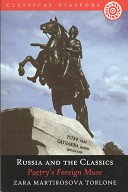
Zara Martirosova Torlone, Russia and the Classics: Poetry's Foreign Muse, London: Duckworth, coll. "Classical Diaspora", 2009. Pp. x, 254.
- ISBN 9780715637173.
- $33.00 (pb).
Recension par Grigory Starikovsky (Ramsey High School/Montclair State University) dans Bryn Mawr Classical Review 2010.01.36.
Extraits en ligne sur amazon.com.
Présentation de l'éditeur:
This important study, the firstin a new series on 'Classical Diaspora', explores the reception ofclassical antiquity in Russian poetry with a particular focus on thewritings of several significant twentieth-century poets: InnokentiiAnnenskii, Viacheslav Ivanov, Marina Tsvetaeva, Osip Mandelshtam andJoseph Brodsky. These poets' engagement with the classics is analysedwithin the wider context of Russia's relationship with Greco-Romanheritage as a gateway to European culture. The earlier phase of thedevelopment of classical reception in Russian poetry is traced fromAntiokh Kantemir and Mikhailo Lomonosov to Alexander Pushkin. Thus thebook offers a concise chronology of Russian poetry's self-constructionas a legitimate Euopean heir to the legacy of Greece and Rome. TheRussian poetic reception of classical literature has its owndistinctive features such as a preoccupation with mythological tragedyand with the reception of Ovid's poetry of exile, setting it apart fromthe traditions and movements associated with Western Europeanclassicism. This fascinating study combines historicist scholarshipwith a sophisticated alertness to recent developments in receptiontheory, producing a compelling account of a hitherto neglected aspectof the classical tradition.
Zara Martirosova Torlone is Assistant Professor of Classics, Miami University of Ohio.
Table des matières:
Preface and Acknowledgements vii
Note on Translation and Transliteration ix
Introduction 1
Chapter 1. 'Russian Antiquity' 7
Classical tradition and reception studies: where does Russia fit? 8
East or West? 10
From Byzantium to the 'Third Rome' 13
Peter the Great and the classics 14
Chapter 2. From Russian Classicism to Aleksander Pushkin 23
Antiokh Kantemir and Vasilii Trediakovskii 24
Mikhailo Lomonosov and Aleksander Sumarokov 26
Gavriil Derzhavin 34
Aleksander Sergeevich Pushkin: the vates 36
Chapter 3. Poetae Docti and their Discontents 55
The twentieth century 55
Innokentii Annenskii: a singer of sorrow 58
Viacheslav Ivanov: between the worlds 61
Russian neoclassical tragedy and the 'Slavonic Renaissance' 74
Chapter 4. Marina Tsvetaeva's Tragic Heroines 92
'Theseus': trilogy interrupted 96
Chapter 5. Osip Mandelshtam: 'Yearning for World Culture' 118
Greek dreams 121
'I was born in Rome and Rome returned to me' 132
Chapter 6. Joseph Brodsky: 'The Uncommon Visage' 153
The anxiety of influence 153
Mythological inversions 156
Wrestling with Empire 174
Epilogue to Exegi monumentum 186
Post Aetatem Nostram: A Brief Postscript and a Very Short Introduction 197
Notes 199
Bibliography 235
Index 250